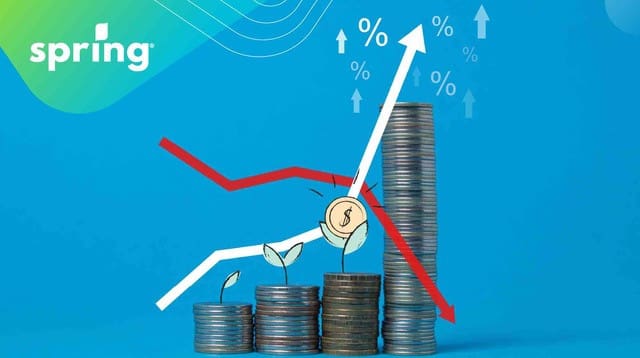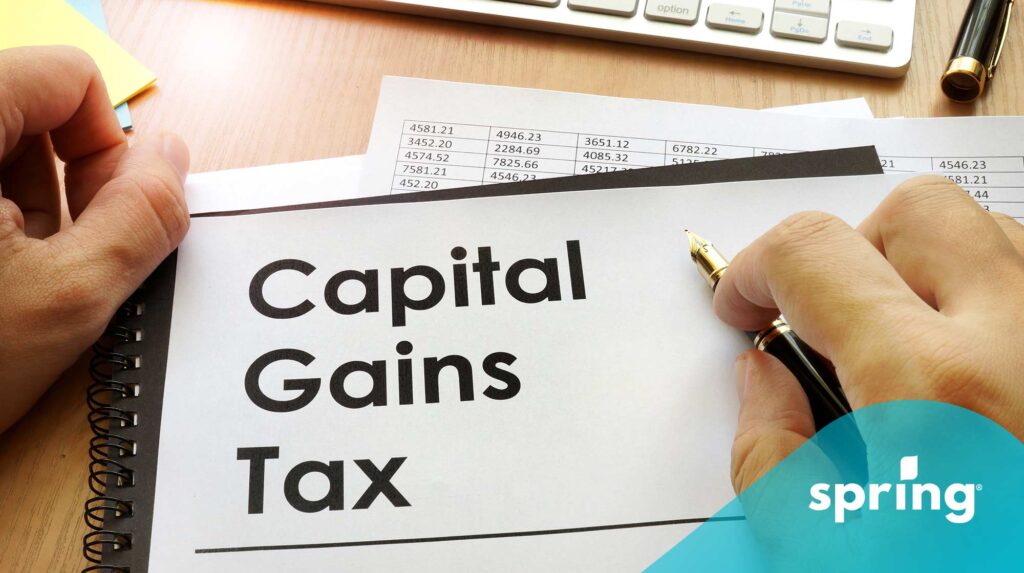Similar to the income we earn, we also have to pay taxes on cryptocurrency. Interestingly enough, though, cryptocurrency is considered a capital asset. This means that while you still have to pay taxes, unless you have a crypto business, you only pay capital gains tax on your crypto earnings.
Canadian Tax Regulations
Just like other investments, you are taxed in Canada on cryptocurrency. How it works, according to the CRA, is that you are taxed on 50% of everything you earn from crypto, as well as other sources of income from crypto, such as staking and being paid in crypto. This includes Bitcoin or any other form of crypto.
How much you pay in income tax on crypto depends on whether it is considered regular income or capital gains. For anything that is considered a capital gain, you will pay the federal and provincial tax rates on 50% of your gains. For regular income, you just pay the standard federal and provincial rates that apply.
That being said, though, there are some instances where you aren’t required to pay any taxes on crypto. Those are:
- Holding crypto assets
- Receiving crypto as a gift
- Moving your crypto between your wallets
- When you create a Decentralized Autonomous Organization (DAO)
- Purchasing crypto with fiat currency (currency backed by the government that isn’t backed by commodities like gold, for example)
Cryptocurrency Tax Regulations
In Canada, there are no regulations that are just for cryptocurrency. They are treated as investments, so the rules and regulations for securities are followed. As mentioned above, depending on how you earn money from crypto, it can be considered business income or capital gains. There are a few guidelines that CRA does have, though, that can help you with your crypto taxes.
When you pay for things using cryptocurrency, the CRA considers this to be a barter transaction. This is because crypto isn’t considered a currency just yet by the government, and the definition of a barter transaction is an exchange of goods or services not using a legal currency.
When you are doing a transaction and need to provide a value for tax purposes, the CRA asks that you calculate the value if there is no direct value associated with the transaction. There are a few different methods you can use to figure this out. In general, though, the government considers the fair market value to be the highest value that a buyer or seller would consider for a particular commodity.
It is also necessary to provide proof of how you found that value. They also prefer that you use the same method for all of your crypto values. Remember to declare each type of crypto separately since they all will have different values. of crypto separately since they all will have different values.

Difference Between Capital Gains and Business Income
It can be a bit complex to figure out if you are considered to have business income or capital gains. Generally, these do need to be looked at for each individual situation, but usual random transactions that aren’t contributing to your annual income would be capital gains. It is good to verify with a professional, though.
Some indications that you are running a business are:
- If you promote a product or a service
- Do things like create a business plan
- Acquire inventory and/or capital assets
- Show intention to make a profit
- Show activity is done for any commercial purpose
There will likely be some consistency with your trading if you start or plan to start a business. In certain circumstances, one transaction could be considered a business, but that wouldn’t always be the norm.
Some examples of crypto businesses are:
- Cryptocurrency Mining
- Cryptocurrency Trading
- Cryptocurrency Exchanges
Cryptocurrency Mining
Mining cryptocurrency is similar to how it sounds. Basically, miners use special computers to solve difficult math problems that confirm different crypto transactions. These are then converted into what miners call blocks. From there, they need to figure out how many blocks are needed to create valid blocks. These groups of blocks are added to public ledgers called blockchains. Once one of these has been created, the miner is then paid in crypto. Their payment is for creating the block as well as transaction fees.
If you are a cryptocurrency miner, your taxes are based on whether you mine as a hobby or if it is a business. This is mostly dictated by how much you mine as well as how much income you earn. If you are just seen as an individual, then you only pay capital gains tax; if your mining operation is considered to be a business, then you will have to pay business income taxes.
Some information you should keep in a file at tax time as a miner:
- Mining hardware receipts
- Expense receipts
- Mining pool details and records
- Related mining expenses
Cryptocurrency Trading
This is trading one type of crypto for another. For tax purposes, this is an example of a barter transaction. This is when you find the fair market value of each currency and then declare it in Canadian dollars on your income tax return. The name for this is a disposition. Trades are taxed as capital gains or losses based on the fair market value in Canadian dollars.
Cryptocurrency Exchanges
This consists of using online exchange platforms for cryptocurrency. Some examples of this would be Binance and Coinbase. Just because you are using a platform to help you with your crypto buying, selling and trading, it doesn’t mean you aren’t subject to taxes. These platforms can help you make informed decisions as well as keep track of all of your crypto transactions. Which platform you use will make a difference in how you find this information and submit it to the CRA with any other required information.
Capital Gains
If you qualify to file for Crypto Capital Gains Tax instead of business income, the way you calculate capital gains on your annual income tax return is a little bit different. For personal income tax treatment, Capital gains are taxed at a rate of ⅓ for amounts $250,000 or lower. For amounts above $250,000, you’ll be taxed at an inclusion rate of ⅔.
That said, when considering crypto tax obligations and crypto capital gains, you also need to consider net capital loss. When it comes to cryptocurrency transactions, capital losses can be used to offset capital gains. These are tax-deductible and can reduce your tax liability.
When it comes to income subject to capital gains, it’s important to remember that it’s taxed differently from employment income or other income considered taxable income. These amounts are taxed at the same personal tax allowance rates; however, not all the amounts are taxed. Only ½ or ⅔, based on which inclusion rate you qualify for.
Taxes When Using Crypto Platforms
When you are using different cryptocurrency platforms and different currencies, it is important to file all of those different transactions separately. Each crypto asset service provider’s process will be different, though when it comes to gathering the information you need at tax time, you do need to keep track of all the crypto transactions you have made for each tax year. It is required to keep your crypto tax reports for 6 years from the end of the last relevant tax year.
The things that should be included in your records are:
- Transaction dates
- Receipts for purchases and transfers
- Fair market value at the time the transaction occurred
- Wallet records
- Cryptocurrency addresses
- Exchange records
- Accounting costs
- Legal costs
- Software costs for managing taxes
- Transaction descriptions
The amount that you pay in taxes depends on whether the income is considered business income or not. If it is, then you pay tax on 100% of your earnings. If it’s not, then you pay a capital gains tax, which means you only pay tax on 50% of your profits.
Binance and Filing Taxes
While Binance does not provide tax documents to help you file your tax returns, it does keep track of all of your transactions. You can log in to your account at any point and download all of this information easily. While it will not contain everything that you need in order to file your taxes, it will provide you with all of your transaction history and anything related to that.
In order to access this information, you use the Binance Tax Tool. It allows you to view and edit your tax report. You can then generate your tax report as well. This makes it a lot simpler to calculate your liabilities.
Another important thing to remember about Binance is that while they do not report all transactions to the Canada Revenue Agency, they do report all transactions over $10,000. Any agency that deals with money has to report any transactions over $10,000, so you will notice that they all do it, including Crypto.com.
Coinbase and Filing Taxes
Just like Binance, Coinbase provides all your transactions in a downloadable form to help with making filing your taxes easier. While Coinbase does not directly report to the CRA. Most financial institutions and platforms, like Binance, report transactions over $10,000; Coinbase will soon be reporting transactions over $1000 in Canada.
Wealthsimple and Filing Taxes
Unlike Coinbase and Binance, Wealthsimple will report all of your crypto transactions and crypto earnings to the CRA at the end of the year. They handle all of the tax stuff for you, making it much easier than other platforms. While they do report all transactions, not just the ones over $1000 or $10,000, you would have to report all of your transactions anyway to avoid any tax penalties, audits and even tax evasion.

Are Cryptocurrency Transactions Reported to the CRA
Whether or not your crypto transactions are reported to the CRA or not is based on the crypto platform that you use. This is different from other types of securities because crypto isn’t as federally regulated as others. When it comes to your crypto tax bill, it’s important that you report all of your transactions, whether they were reported or not. This is because all crypto transactions are subject to income tax according to the Income Tax Act.
Another reason that you’re also required to report your crypto transactions to the CRA yourself during tax season is to get your correct marginal tax rate, which is also your crypto tax rate. It also allows you to determine whether your crypto transactions are taxable as well as calculate your crypto gains.
Is Using Binance Legal in Canada?
While Binance is one of the most popular crypto exchanges due to its competitive trading platform fees, it’s actually no longer a legal platform to use in Canada. This is because they took all of their services off the Canadian market in 2023. This is mostly due to the fact that they didn’t comply with the new rules regarding investor limits and other aspects of crypto trading. It’s required that crypto companies follow certain standards in order to operate in Canada.
Unfortunately, due to Bianance’s inability to conform to these rules, it’s not considered to be a prohibited platform. However, there are tons of other crypto platforms out there that can help you invest your money in crypto while following Canada’s crypto rules.
Is Coinbase Legal in Canada?
Yes, in fact, Coinbase is one of the most popular crypto exchanges in Canada. Many Canadian crypto investors use this platform for their digital assets. When it comes to crypto mining tax, you have to report crypto taxes as well as report capital gains yourself. With the Canada crypto tax, platforms may report some transactions, but they don’t report your cryptocurrency income to the CRA. You report crypto income the same way you report business income based on your annual profits.
Cashing Out Cryptocurrency Without Paying Taxes
Unfortunately, if you cash out cryptocurrency, then you have to pay taxes on it. The factors like business income and capital gains will determine how much tax you are required to pay. What many people don’t realize is that the CRA is monitoring all crypto activity. They work with lots of crypto platforms to verify that those who are investing and trading in crypto are filing their taxes correctly.
The CRA is also involved with FINTRAC. This stands for Financial Transactions and Reports Analysis Canada. FINTRAC monitors financial institutions and investigates potential cases of money laundering and tax evasion. Any transactions that are registered with FINTRAC also contain a copy of your government-issued ID, which helps the government connect that money to you. Really, between the crypto platforms the federal government is working with and FINTRAC, there is not much of a point in trying to avoid paying crypto taxes. Avoiding paying your tax obligations or filing them together can be considered tax evasion.
Another way some people like to try to avoid paying taxes is to invest in TFSAs (Tax Free Savings Accounts) and RRSPs (Registered Retirement Savings Plans). While it can be done with some forms of investments, it can’t be done with cryptocurrency. If it is done with other types of investments, if it isn’t done correctly, you could still be subject to paying taxes and penalties. If you are looking into investing in your crypto, though, there are crypto-backed ETFs or other types of crypto investments. This won’t avoid taxation, though, because once an asset is cashed out, you do have to claim it. You, however, could earn more money with these different types of investments.
Reporting Cryptocurrency
The process of reporting crypto is different, whether your income is considered a taxable capital gain or business income. If it is considered income, there is a form called the T-2125, also known as the Statement of Business and Professional Activities. Because this is business income tax, you are able to write off anything related to your business, like subscriptions, internet bills and any office-related expenses.
You can also claim if you had negative earnings with your crypto business. This is called a non-capital loss and can be deducted from any other taxable income you receive. Keep in mind that if you can’t file the non-capital loss in one year, it can be carried forward to the next year.
If your crypto income is a capital gain or you have any capital losses, those can be claimed under Section 3. As we mentioned before, capital gains taxes apply, meaning you only pay tax on 50% of the gain. If you have capital losses and can’t use them, they can be carried forward to the next year. And, just like with day trading taxes, the superficial loss rule applies to crypto as well.
Valuing Cryptocurrency
When you value your cryptocurrency, first you have to distinguish whether it is capital property or inventory. In order to calculate the value of your capital property, you need the value it was purchased at as well as the fair market value. This will allow you to calculate the capital gain.
There are a few different methods to value any crypto you consider to be inventory. The first is to look at the value when the inventory was purchased, as well as its fair market value at the end of the year and use the lowest amount. The second method is to take all of your inventory, then value it at the end of the year at fair market value. There are plenty of other methods you could use as well. Just be aware, whichever method you choose, you use it every year.
Koinly Canada
If you’re looking for a simpler way to file your Cryptocurrency taxes, then Koinly Canada can help. It’s a Canadian Bitcoin tax calculator and crypto tax software for crypto investors that works with over 750 crypto sites. It calculates your gains and losses, pre-fills your forms and can even integrate with TurboTax. If you do your own taxes, this can be a great way to simplify them.
When it comes to filing your taxes, the CRA can already track your crypto transactions. What Koinly does is put all of those transactions together in order to help you avoid any mistakes. Missing some of your transactions can become a huge issue; using Koinly can simplify the process.
Different Methods For Reporting Crypto Income
In Canada, there are two different methods for filing crypto taxes. You can use the Average Cost Basis Method or the Adjusted Cost Basis Method. While both have the same income tax rates, the methods of calculating them are different.
The average cost method is calculated as the total cost of purchasing divided by the number of underlying shares. The adjusted cost is the cost plus expenses to acquire it. You can use these methods along with capital gains and capital losses to offset gains and spousal tax credits. This also includes lost or stolen crypto and business crypto transactions. It’s also important to note that if your crypto is held outside of Canada, it’s considered to be specified foreign income, which affects the tax implications and overall tax liability.
Marginal Tax Rates in Canada
When it comes to calculating your taxes in Canada, your federal and provincial marginal tax rates are going to be key in what you pay, whether you have capital gains or not. Here’s what they are in 2026.
| Tax Bracket | Tax Rates |
| $58,523 or less | 14.0% |
| $58,523 to $117,045 | 20.5% |
| $117,045 to $181,440 | 26% |
| $181,440 to $258,482 | 29% |
| More than $258,482 | 33% |
The provincial rates are different based on where you live. This is what they are for 2026 as well.
| Provinces/Territories | Tax Rates |
| British Columbia | 5.06% on amounts from $0 – $50,363 7.7% on $50,363- $100,728 10.5% on $100,728 – $115,648 12.29% on $115,648- $140,430 14.7% on $140,430 – $190,405 16.8% on $190,405 – $265,545 20.5% on $265,545 and over |
| Alberta | 8% on the first $61,200 10% over $61,200 up to $154,259 12% over $154,259 up to $185,111 13% over $185,111 up to $246,813 14% over $246,813 up to $370,220 15% over $370,220 |
| Saskatchewan | 10.5% first $54,532 12.5% over $54,532 up to $155,805 14.5% over $155,805 |
| Manitoba | 10.8% first $47,000 12.75% over $47,000 up to $100,000 17.4% over $100,000 |
| Newfoundland and Labrador | 8.7% first $44,678 14.5% over $44,678 up to $89,354 15.8% over $89,354 up to $159,528 17.8% over $159,528 up to $223,340 19.8% over $223,340 up to $285,319 20.8% over $285,319 up to $570,638 21.3% over $570,638 up to $1,141,275 21.8% over $1,141,275 |
| Nova Scotia | 8.79% on the first $30,995 14.95% over $30,995 up to $61,991 16.67% over $61,991 up to $97,417 17.5% over $97,417 up to $157,124 21% over $157,124 |
| Prince Edward Island | 9.5%% on the first $33,928 13.47% over $33,928 up to $65,820 16.60% over $65,820 up to $106,890 17.62% over $106,890 up to $142,250 19% over $142,250 |
| Ontario | 5.05% on the first $53,891 9.15% over $53,891 up to $107,785 11.16% over $107,785 up to $150,000 12.16% over $150,000 up to $220,000 13.16% over $220,000 |
| Quebec | 14% on the first $54,345 19% over $54,345 up to $108,680 24% over $54,345 up to $108,680 25.75% on amounts over $132,245 |
| New Brunswick | 9.4% on the first $52,333 14.0% over $52,333 up to $104,666 16% over $104,666 up to $193,861 19.5% on amounts over $193,861 |
| Northwest Territories | 5.9% on the first $53,00 38.6% over $53,003 up to $106,009 12.2% over $106,009 up to $172,346 14.05% on amounts over $172,346 |
| Yukon | 6.4% on the first $58,523 9% over $58,523 up to $117,045 10.9% over $117,045 up to $181,440 12.93% over $181,440 up to $258,482 12.80% over $258,482 up to $500,000 15% on amounts over $500,000 |
| Nunavut | 4% on the first $55,801 7% over $55,801 up to $111,6029 % over $111,602 up to $181,439 11.5% on amounts over $181,439 |
Are Cryptocurrency Taxes Filed With Your Regular Tax Return?
While we’ve already discussed the capital gains inclusion rate and crypto taxes a bit, it’s important to also note that any income from crypto and mining crypto is included with your regular income. While you aren’t taxed on your basic personal amount, you will be taxed on income tax based on mining crypto taxed, your crypto tax bill, and more.
Even with crypto income, the same rules regarding your taxes apply. You can get tax breaks on any taxable event, offset taxable capital gains, claim refundable and non-refundable tax credits, and more. Since the capital gains equally apply to all capital gains, you can even forward your gains and losses to future tax years. Your adjusted cost base is needed to calculate this.
Final Thoughts
When it comes to filing your taxes in Canada, there are quite a few things to consider. One of these is investment income, which includes cryptocurrency. How you invest the funds will determine how you are taxed on the funds. They may be taxed at your marginal tax rate or by using capital gains.
In Canada, any form of income you earn has to be claimed. While crypto isn’t regulated as strictly as some other types of income, it still has to be reported. If you’re unsure the best way to do this, then you can talk to a tax professional who can help you calculate this.








